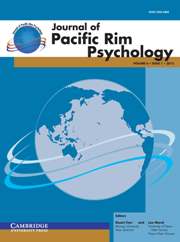Article contents
Black African Immigrants to Australia: Prejudice and the Function of Attitudes
Published online by Cambridge University Press: 23 February 2012
Abstract
In recent years there has been an increase in Black African immigrants to Australia; however, there is no social psychological research that directly examines community attitudes towards this group. Here, the findings of a community survey in Western Australia are reported using data collected from 184 Australian participants. We were particularly interested in prejudiced attitudes and the function of attitudes towards Black African immigrants. On prejudice, a reliable and valid instrument measuring attitudes towards Black African immigrants was constructed. On functions, the most frequently reported function of attitude was ‘value-expressive’ (‘My attitudes give expression to my values’), followed by experiential-schematic (‘Helps me to make sense of the world’) and indirect experiential-schematic (‘Media, friends and family help me to make sense of the world’). While there was no significant difference between immigrant-accepting versus immigrant-rejecting participants on the value expressive or the experiential schematic functions, rejecting participants scored higher on the indirect experiential schematic function, highlighting the salience of second-hand information. The participants' most important reason for potentially changing their own attitudes towards Black African immigrants, however, were direct experience (experiential-schematic), followed by values (value expressive) and indirect experience (indirect experiential-schematic), two functions that were equally important. Qualitative open-ended interviews about attitudes converged with these themes, and added ‘integration’ by assimilating Australian culture, and not being involved in criminal activities (which highlights again a role for the media). We discuss these findings and derive a clear direction for anti-prejudice strategies at community and government levels.
- Type
- Articles
- Information
- Journal of Pacific Rim Psychology , Volume 4 , Issue 2: Includes Special Section: Cultural Diversity Across the Pacific , 01 December 2010 , pp. 116 - 129
- Copyright
- Copyright © Cambridge University Press 2010
- 18
- Cited by


